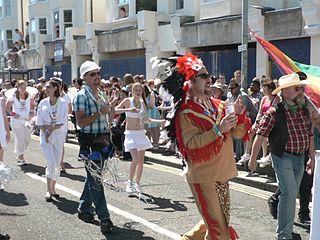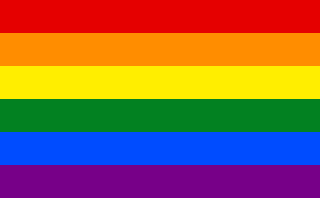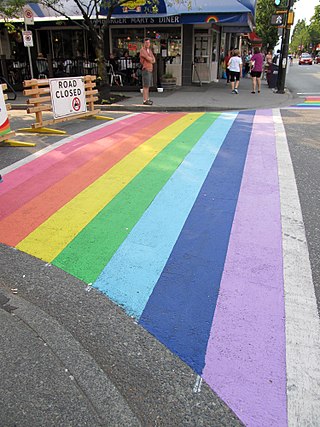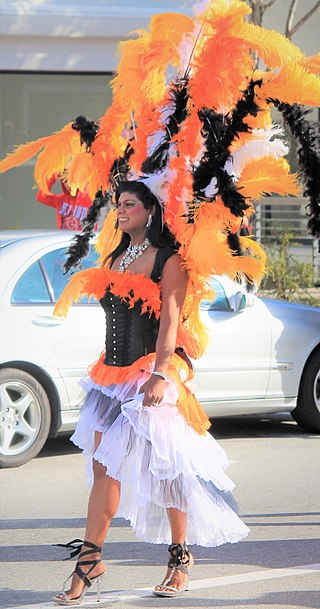
LGBT tourism is a form of tourism marketed to gay, lesbian, bisexual, and transgender (LGBTQ) people. People might be open about their sexual orientation and gender identity at times, but less so in areas known for violence against LGBT people.

Brighton and Hove Pride is an annual LGBT pride event held in the city of Brighton and Hove, England, organised by Brighton Pride, a community interest company (CIC) which promotes equality and diversity, and advances education to eliminate discrimination against the lesbian, gay, bisexual and trans (LGBTQ) community.

The LGBT community of Brighton and Hove is one of the largest in the United Kingdom. Brighton, a seaside resort on the south coast of England, has been described in some media as a "gay capital" of the UK, with records pertaining to LGBT history dating back to the early 19th century.

The Frameline Film Festival began as a storefront event in 1976. The first film festival, named the Gay Film Festival of Super-8 Films, was held in 1977. The festival is organized by Frameline, a nonprofit media arts organization whose mission statement is "to change the world through the power of queer cinema". It is the oldest LGBTQ+ film festival in the world.

The rainbow flag or pride flag is a symbol of LGBTQ pride and LGBTQ social movements. The colors reflect the diversity of the LGBTQ community and the spectrum of human sexuality and gender. Using a rainbow flag as a symbol of LGBTQ pride began in San Francisco, California, but eventually became common at LGBTQ rights events worldwide.

Pride is the promotion of the self-affirmation, dignity, equality, and increased visibility of lesbian, gay, bisexual, transgender and queer (LGBTQ) people as a social group. Pride, as opposed to shame and social stigma, is the predominant outlook that bolsters most LGBT rights movements. Pride has lent its name to LGBTQ-themed organizations, institutes, foundations, book titles, periodicals, a cable TV channel, and the Pride Library.

Atlanta Pride, also colloquially called the Atlanta Gay Pride Festival, is a week-long annual lesbian, gay, bisexual, transgender (LGBTQ) pride festival held in Atlanta, Georgia. Established in 1971, it is one of the oldest and largest pride festivals in the United States. According to the Atlanta Pride Committee, as of 2017, attendance had continually grown to around 300,000. Originally held in June, Atlanta Pride has been held in October every year since 2008, typically on a weekend closest to National Coming Out Day.
Although same-sex sexual activity was illegal in Canada up to 1969, gay and lesbian themes appear in Canadian literature throughout the 20th century. Canada is now regarded as one of the most advanced countries in legal recognition of lesbian, gay, bisexual, transgender and queer (LGBTQ) rights.

Cape Town Pride is an annual gay pride event ending with a pride parade held in Cape Town, South Africa. It usually runs from around the end of February and is a week of festivals, parties and other events.

The gay flag of South Africa is a pride flag that aims to reflect the freedom and diversity of South Africa and build pride in being an LGBTQ South African. It was registered as the flag of the LGBTQ Association of South Africa in 2012 and is not an official symbol of South Africa.

Seoul Queer Culture Festival, formerly Korea Queer Culture Festival, is an annual modern Korean festival on LGBT rights. It includes a pride parade and film festival events. The festival lasts for a week or two, and usually takes place in late May to early June. As it was the only queer culture festival in Korea until 2009, when Daegu Queer Culture Festival began, it was also commonly called Korea Queer Festival or Queer Culture Festival. The event is Korea's largest LGBT festival.

There have been pride parades in South Africa celebrating LGBT pride since 1990. South African pride parades were historically used for political advocacy protesting against legal discrimination against LGBT people, and for the celebration of equality before the law after the apartheid era. They are increasingly used for political advocacy against LGBT hate crimes, such as the so-called corrective rape of lesbians in townships, and to remember victims thereof.

New York City has been described as the gay capital of the world and the central node of the LGBTQ+ sociopolitical ecosystem, and is home to one of the world's largest and most prominent LGBTQ+ populations. Brian Silverman, the author of Frommer's New York City from $90 a Day, wrote the city has "one of the world's largest, loudest, and most powerful LGBT communities", and "Gay and lesbian culture is as much a part of New York's basic identity as yellow cabs, high-rise buildings, and Broadway theatre". LGBT travel guide Queer in the World states, "The fabulosity of Gay New York is unrivaled on Earth, and queer culture seeps into every corner of its five boroughs". LGBT advocate and entertainer Madonna stated metaphorically, "Anyways, not only is New York City the best place in the world because of the queer people here. Let me tell you something, if you can make it here, then you must be queer."
The LGBT community in London is one of the largest within Europe. LGBT culture of London, England, is centred on Old Compton Street in Soho. There are also LGBT pubs and restaurants across London in Haggerston, Dalston and Vauxhall.

Vancouver's LGBT community is centered on Davie Village. Commercial Drive has historically acted as a gayborhood for the Vancouver lesbian community. Historically, LGBT people have also gathered in the Chinatown and Gastown neighborhoods. Former establishments include Dino's Turkish Baths, a gay bathhouse on Hastings, and the city's first drag bar, BJ's, on Pender Street.

The ongoing COVID-19 pandemic has highlighted inequities experienced by marginalized populations, and has had a significant impact on the LGBT community. Gay pride events were cancelled or postponed worldwide. More than 220 gay pride celebrations around the world were canceled or postponed in 2020, and in response a Global Pride event was hosted online. LGBTQ+ people also tend to be more likely to have pre-existing health conditions, such as asthma, HIV/AIDS, cancer, or obesity, that would worsen their chances of survival if they became infected with COVID-19. They are also more likely to smoke.

The Pink Loerie Mardi Gras and Arts Festival is an annual LGBTQ Pride carnival event and parade held in Knysna, a coastal township in the Western Cape province of South Africa. Events include their version of the Wigstock drag queen festival, a bear fest, athletic events, and an art festival. It is one of the country's largest LGBTQ events. Since its start in 2000 it has grown to be a significant event for the town culminating in the grand finale of Pink Loerie, Knysna Pride parade and its 1000-person after-party held on the final weekend with floats, performers, and DJs. The Knysna loerie is a green bird but the color pink has a long association with LGBTQ culture.

The LGBT community of Sydney, in New South Wales, is the largest in Australia and has a firm place as one of the iconic gay cities of the contemporary world. In a 2013 Pew Research poll, 79% of Australians agreed that homosexuality should be accepted by society, making it the fifth most supportive country in the survey behind Spain (88%), Germany (87%), Canada and the Czech Republic. With a long history of LGBT rights activism and the annual three-week-long Sydney Gay and Lesbian Mardi Gras festival, Sydney is one of the most gay-friendly cities in Australia and in the world.
















